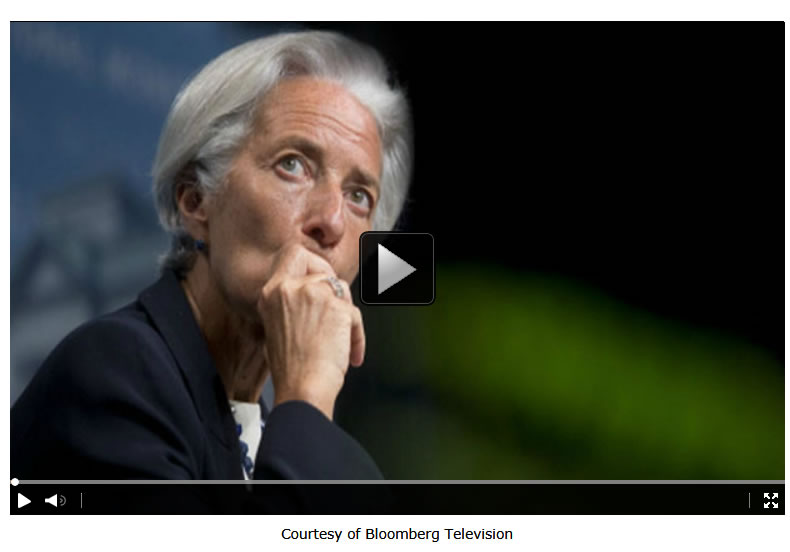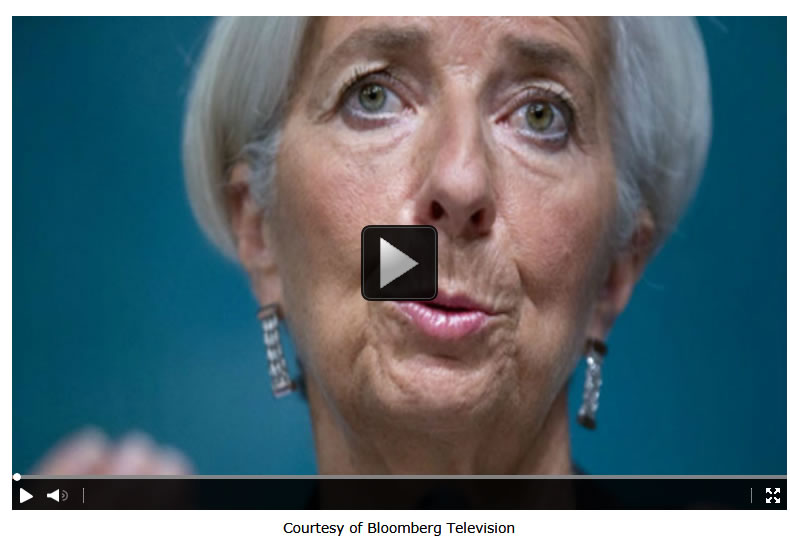Lagarde Admits Europe Facing Serious Crisis on the Horizon
Economics / Euro-Zone Oct 02, 2014 - 09:27 PM GMTBy: Bloomberg
 In an interview with Bloomberg's Tom Keene at the International Monetary Fund's Headquarters in Washington D.C., IMF Managing Director Christine Lagarde said the world still faces serious clouds on the horizon., "We are facing serious clouds on the horizon; we have a lot of uncertainty...we are revising potential growth." Lagarde also said:
In an interview with Bloomberg's Tom Keene at the International Monetary Fund's Headquarters in Washington D.C., IMF Managing Director Christine Lagarde said the world still faces serious clouds on the horizon., "We are facing serious clouds on the horizon; we have a lot of uncertainty...we are revising potential growth." Lagarde also said:
- She's still concerned about global economy.
- Concerned about pace of world growth "which is why I talked about the new mediocrity"
- IMF is watching markets with a lot of hesitation.
- IMF monitoring buoyant markets, weak economies.
- U.S. is clearly one of the bright spots.
- U.S. still needs to invest in infrastructure.
- Sees infrastructure bottlenecks in emerging markets, India.
- World seeing FX readjustment tied to economies.
- Dollar, Euro adjusting to relative Growth rates.
Video: Lagarde: Facing Serious Clouds on Horizon
Lagarde: IMF Can't Finance Hospitals, Others Can

Lagarde: U.S. Clearly One of the Bright Spots
Full Transcript:
12:11
TOM KEENE, HOST, BLOOMBERG NEWS: Here from Georgetown University, and the real problem, Adam, is the questions that the students grilled Madam Lagarde on. I can't top those, but we'll try to do it right now. Wonderful to see you again one week before your important meetings. In July at the Conday Su (ph) speech that you gave, you said we will not return to the pre-crisis world. That's been your theme. Does the G20 nations finally, are they catching up with Lagarde?
CHRISTINE LAGARDE, MANAGING DIRECTOR, IMF: I was concerned then and I'm concerned today, which is why I talked this morning about the risk of this new mediocre horizon that we need to avoid.
KEENE: The new mediocre, the new mediocrity that's out there. Color that for us. How is that different from Dr. El-Erian or Mr. Gross's new neutral? What's the distinction of your new mediocre?
LAGARDE: The new mediocre has three components, if you will. One is it still has the legacies of the crisis. High indebtedness both sovereign and corporate and household sometimes. It has high unemployment in many corners of the world. Those are the legacies. Then we are facing serious clouds on the horizon and we have a lot of uncertainty. So if you combine the legacies, the clouds and the uncertainty, we have this horizon of the new mediocre where we are revising potential growth.
KEENE: Well the urgency that I heard in your speech today is almost on a calculus basis, a first or second derivative. There's an acceleration, an immediacy. We saw it in the stock market yesterday. Where I see it mostly is in declining commodity prices. When you speak to Olivier Blanchard and your economists, how concerned are they about what the markets are telling them about the new mediocre?
LAGARDE: We are watching the markets with - with a concern and with a lot of hesitation because there is clearly a discrepancy between the buoyancy of the markets in many ways - I think forex is a little bit different - but the buoyancy of the markets, asset values at their highest ever. Volatility is very compressed and low. And then at the - the other end, we see a real economy where recovery is not really strong. We see areas of very fragile recovery. So there is that discrepancy between the two which is quite worrying.
KEENE: You do hear one week before the meetings single out (ph) Europe. Mr. Draghi spoke today. I watched tick by tick on the Bloomberg terminal how the markets reacted to his non-news. You need someone besides Yellen, Draghi, Kuroda, Carney, the rest of them to step in with a policy momentum. That's your new momentum. Where will that come from Europe?
LAGARDE: First of all, I totally agree with that these lady and gentlemen that you've mention have done their best. So monetary policy has been pulling a lot, but it can't be alone. And we need the right pace and mix of fiscal measures in those countries that need to continue to adopt their public finance. We need to have serious structural reforms in place to unleash the potential that those economies have. And our recommendation in order to address the short-term demand issue as well as the improvement in the medium term is investment in infrastructure. It's needed across the world.
KEENE: I liked how you parsed that out about infrastructure. We haven't seen that in the United States. You were critical of the United States I'm guessing a year ago at the Economic Club of New York. Do you take your criticism away for these meetings because the US is simply doing better? Look at 4 percent GDP last quarter. Do you give the United States a victory lap?
LAGARDE: It's clearly one of the bright spots. When I look at the advanced economies, the US pops out in a much better condition, and the UK does as well. But clearly on the investment and infrastructure front, more needs to be done.
KEENE: Why - I think all of my viewers, my listeners, readers worldwide are so frustrated by this. Why can't we budget infrastructure that clearly puts blue collar workers, as we say in America, to work? There's an immediate cash on cash benefit. Why can't we jump start infrastructure?
LAGARDE: I think the more of us shout infrastructure is needed, the more of us face this poorly maintained bridges and roads around the planet, not just in the United States, not just in Washington DC where frankly riding a bike is becoming difficulty, but also in the low income countries and the developing countries where the - the power is needed, where there are obstacles to transportation, where there are bottlenecks in emerging market economies such as India for instance. It has to happen. And as you said, it would be good in the short term and it would support the medium-term growth potential as well.
KEENE: You mentioned new mediocrity. You mentioned new momentum. You also mentioned a new multilateralism. You mentioned G20. I was thinking of Ian Bremmer and his G zero view. What is our risk of tilting away from all the good we've seen over 20, 30, 75 years with the IMF? What is the risk now with this geopolitical 2014 of becoming a G zero world?
LAGARDE: I think the risk is abating, although the challenges and the uncertainties are increasing and there might be a correlation between the two. But you clearly see a collective drive to address some of the uncertainties that we have around, and that's for the better.
KEENE: We see this now - and just to digress here, I would say it's away from the IMF remit. People would look to the World Bank for assistance in Western Africa, the immediacy of Ebola. What can you do and what will be addressed at these meetings on - on Western Africa and for that matter on Dallas, Texas, with Ebola?
LAGARDE: Well I'm really pleased that you mentioned that. But the IMF does its bit too. And in the most expedited time with collective drive from both the staff and the board of the IMF, we approved last week a package of $130 million to go to these three countries.
KEENE: People don't know this about you. They don't know how granular you get at the IMF. Let's go right to Liberia. I did a deeply emotional interview the other day on Surveillance with a woman from Liberia who literally talked about how people are dying. What will the IMF do to assist Liberia?
LAGARDE: We cannot cure people. We cannot finance hospitals. We cannot send doctors, which is what is most needed, but it's for others to do that. And I'm delighted that the World Bank is doing its fair bit as well. We are in the business of providing financial support to states in needs. And what we do is that we give budgetary support, and in the case of Liberia they need money because they're not collecting tax for obvious reasons. They have additional expenses for obvious reasons.
So in a very expedited way we said, okay, bingo. We're going to put together an additional - I forgot whether it was $40 million or $45 million for Liberia, so that you can immediately go about spending public money in order to improve the treatment, in order to get the doctors to come in, in order to buy the equipment to isolate people. That's what the IMF can do. That's our mission, to provide financial support to countries that are facing difficulties of that nature.
KEENE: Georgetown here, you're wearing Hoya blue and gray today. That was good to see. You got a wonderful question from a student on Piketty's great book on capital. Let me move forward to the new book of the moment, which is Henry Kissinger's World of Order. I'm - I'm loving it. I think it's just absolutely fabulous. Are you reading Kissinger's book?
LAGARDE: I bought it. I haven't started it, but I will start. I have --
KEENE: It's really quite good. I'm doing this thing with it and it's a real great overview. What is Lagarde's world order? Secretary Kissinger speaks of the need to reframe 400 years with all these challenges we've had the last couple months. What is Lagarde's world order?
LAGARDE: It's the post-Westphalia order that - that we need to collectively look at. I don't have a magic stick, but my intuition tells me that nations have to be much more collective, have to be much more together. And I wouldn't be surprised if in the future we saw regional organizations framing some of the policies dealing with some of the issues, and a coordination between them at the global level because some issues have to be resolved collectively engaging the entire community. It's no longer the exchange rate variations for which the IMF used to be a referee, but it's financial regulation, financial safety nets. It's how do we help the development of countries? How do we - it's not our - the IMF (inaudible) but how do we deal with infectious disease that can spread irrespective of borders?
KEENE: (Inaudible) blocs and that fear of that word bloc and what we knew from the past century, we see what's happening in Ukraine and we see this buttressing of NATO against Putin's Russia and is it - is it the new Soviet Union, is it the new Peter the Great. How do you perceive the - the linkage here of Europe in a post-Westphalian place? Where will we be 10 years now from the north down to the south of Europe?
LAGARDE: Well I very much hope that the economic situation will have improved, that collective policies will have been decided, that in addition to building a currency zone, a better fiscal union and hopefully a completed banking union, the European countries will move towards better integration altogether from a political standpoint as well as from an educational standpoint. There are lots of things underway. A lot of criticism as well. But they - hopefully they will be more collective.
KEENE: Well within that optimism, and I know you're talking the book of the IMF, do you worry about a currency war? Draghi's getting weaker (ph) and you just came back from Japan. Abe, I don't know what he wants, a 110, a 120, a 150 yen. That sounds like a currency war. Is it?
LAGARDE: I think we're seeing a readjustment that is also based on the readjustment of the real economies.
KEENE: Fair. Fair.
LAGARDE: If you look at what is the brightest spot, it's the US. So the dollar is appreciating as a result. If you look at the weakest in the advanced economies at the moment, it's the eurozone. The euro is depreciating relative to the others.
KEENE: Very quietly in your speech today on labor economics, you did not mention France, your France. You mentioned Germany and Sweden of having good labor practices. What can this French government or the next French government learn from Germany or Sweden of a more efficient, more productive labor economy?
LAGARDE: Well everything --
KEENE: I don't think she's going to answer that.
LAGARDE: All I will say is that it's been tried, tested, and it's been successful in other places. So those books have to be looked at, and then each country needs to invent its own system but needs to deal with bottlenecks, rigidities, lack of fluidity, barriers to - to talent and growth.
KEENE: Let me ask you the final very important question. 3:07 pm tomorrow you'll be in the IMF box seats. San Francisco Giants, Washington Nationals. How good do the Nationals look coming off that no-hit performance?
LAGARDE: I wish I knew. I hope the best on the two teams.
KEENE: Are we - are you up to speed, Madam Lagarde, on baseball?
LAGARDE: No.
KEENE: Okay. Please take a note in the room. Let's get her up to speed. Red Sox. Okay. Madam Lagarde, thank you so much.
12:23
Copyright © 2014 Bloomberg - All Rights Reserved Disclaimer: The above is a matter of opinion provided for general information purposes only and is not intended as investment advice. Information and analysis above are derived from sources and utilising methods believed to be reliable, but we cannot accept responsibility for any losses you may incur as a result of this analysis. Individuals should consult with their personal financial advisors.
Bloomberg Archive |
© 2005-2022 http://www.MarketOracle.co.uk - The Market Oracle is a FREE Daily Financial Markets Analysis & Forecasting online publication.





